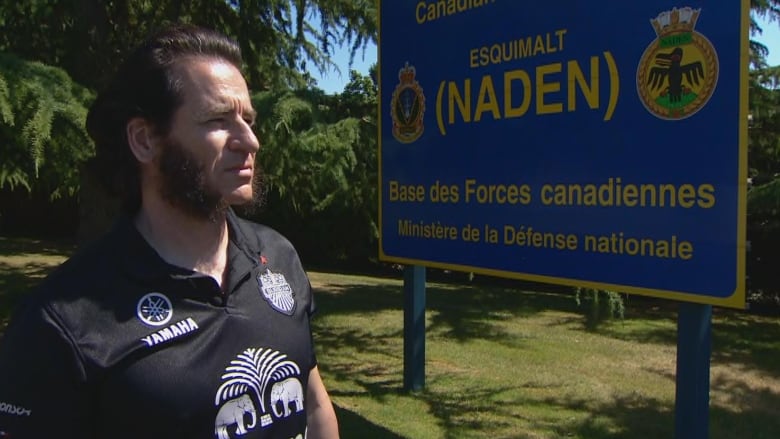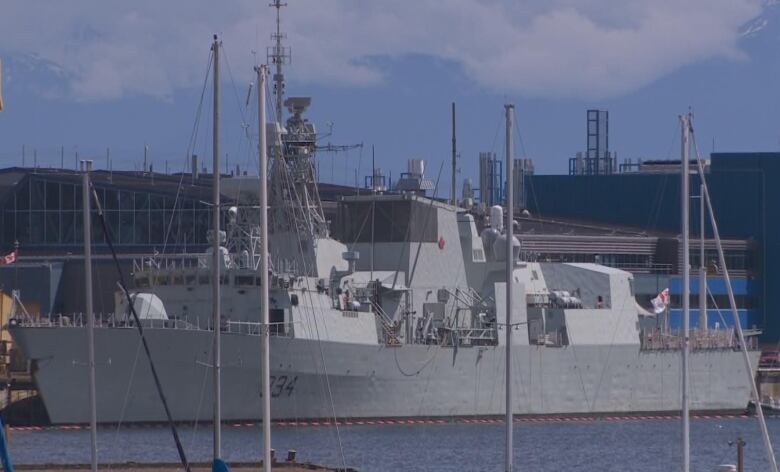Transport Canada pays $518K to Victoria man who says job discrimination left him destitute
13-year fight isn’t over as B.C. man demands more compensation, Transport Canada seeks to claw back payout

A Victoria man has been handed what he says is the biggest human rights damage award in Canada because he was denied a job as an intelligence analyst with Transport Canada on account of his depression.
Chris Hughes, 50, has received $518,000 from the agency — reduced to $353,000 after deductions.
A former customs officer, he had applied to Transport Canada to become a marine intelligence analyst at Canadian Forces Base Esquimalt, near Victoria, a position created after the Sept. 11, 2001, attacks in the U.S. to protect the West Coast from seaborne terrorism.
He says he didn't get the job after he revealed he suffered from depression. The rejection led to other failed bids for government jobs, deepened his depression and made him unable to hold down full-time work, Hughes alleges.
The payment comes one year after the Canadian Human Rights Tribunal ruled Hughes was due the salary and benefits he would have earned — and should be given the job he applied for 13 years ago "without competition."
But Hughes says it's not enough.
"I should be paid a lot more money," he said. "They forced me into poverty. I lost everything. I was going without food many days."
Hughes is seeking a judicial review of the tribunal decision, claiming he's owed an additional $1.2 million— because the tribunal ordered that he receive five years of compensation, not 13.
Transport Canada is seeking its own review and trying to overturn the payout. A hearing is scheduled for later this month.
In the meantime, Hughes is paying off his debts and re-establishing his credit rating with the money he's received, so he can apply for the security clearance needed for the analyst job and take back the position he was denied.
"The job's mine as long as I pass this top secret clearance, including the credit worthiness," said Hughes. "I expect to be passed."
Revealed his depression
Hughes's battle began in 2005, when he applied for the marine intelligence analyst job. He was the top candidate, but during the interview, Hughes revealed he suffered from depression.

He didn't land the job— nor other government jobs that he applied for later.
Hughes alleges he was blacklisted.
"In Victoria, the [human resources] community and the federal government is pretty small," he said. "And I do believe that word was spread throughout the departments in Victoria not to hire me.
"I was screened out based on negative stereotypes on mental health …That's discriminatory."
The tribunal would later acknowledge that there were "pejorative emails" sent among government employees that "tainted the mind" of other interviewers who encountered Hughes.
Financially ruined
Hughes says he was driven deeper into depression and became virtually unemployable in his chosen field — working for federal agencies — and the deepening depression left him unable to hold down or seek other jobs.
He says he was financially ruined, made homeless and forced to couch surf.

In 2007, Hughes filed a complaint against Transport Canada with the human rights tribunal. In 2014, the tribunal ruled Hughes had been discriminated against because of his depression. It called some aspects of the case "troubling."
It directed the two sides to agree on a remedy or it would impose one. Transport Canada appealed the decision in Federal Court but lost.
Last year, the human rights tribunal finally issued its own solution, telling Transport Canada to "instate [Hughes] … on the first reasonable occasion, and without competition, to the position of intelligence analyst."
It also ordered the government department to pay Hughes for lost wages and compensation but imposed a cap, assuming the job would have begun in May 2006 and ended May 2011, an arbitrary end date.
In March, Transport Canada finally decided on a $518,000 gross settlement. Hughes's lawyer alleges it's the largest discrimination payout in Canada to date. Public records show a Hamilton school board employee received a discrimination payout of approximately $480,000 in 2016.

Transport Canada still fighting
Transport Canada won't say why it's continuing to fight the payout.
"Transport Canada has implemented the remedy decision to the extent required, despite the fact that the judicial review application … remains to be heard and decided upon," the agency said in an email to CBC News.
Since the matter is before the courts, the agency declined further comment.
Hughes says trying to claw back his payout is a waste of taxpayers' dollars.
"I think they've handled it over the last decade in a very vindictive manner and not very cost effective for the taxpayer."
Hughes wins second complaint
Hughes might be due another massive payout in a separate but related case.
In May, the Canadian Human Rights Tribunal ruled on another of his discrimination complaints— against the Canada Border Services Agency (CBSA).
The CBSA denied Hughes's application for a position in 2006, shortly after the rejection by Transport Canada.
The human rights tribunal ruled there was a "subtle scent of discrimination" by border agency employees and interviewers, and that Hughes was "discriminated against in the hiring process."
A dollar figure for what he's owed for that job rejection will be determined at a future hearing.
Hughes believes it could be even bigger than what he received in the Transport Canada case.
"Best case scenario would be $2 million in back pay, damages, pension, expenses, etc.," he said.
He says he knows there could be more appeals, and both of his cases could ultimately end up in the Supreme Court of Canada. But he's not giving up.
"I'm pretty competitive," he said. "I will fight it for a long time."

